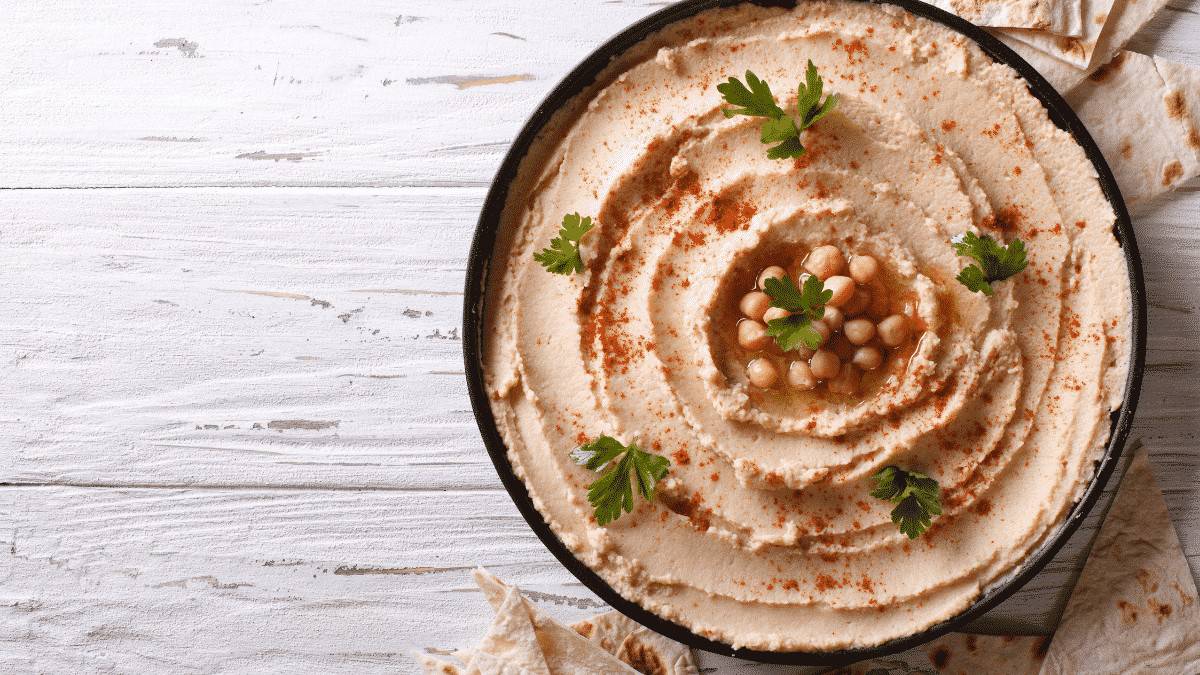Answer: Yes! Hummus is made of chickpeas, and you can have as much delicious Hummus as you want.

If you are just starting a vegan diet and want to know whether vegans can eat hummus, then it’s a big fat yes!
Can Vegans Eat Hummus?
Made from plant-based ingredients, the origin of this dip and spread is the Middle East. Not only is hummus delicious, but it’s also versatile and packed with nutrients. You can make this dip by blending tahini, chickpeas, lemon juice, garlic, and olive oil in a food processor.
Whether you make it at home or buy it from the store, hummus is cheap and comes in various flavors. It’s also one of the most-vegan products you can get your hands on.
Health Benefits of Hummus
Now that you know that hummus is completely safe for vegans, let’s look at some of its health benefits:
- Helps in controlling blood sugar level
Including hummus in your diet can be an effective way to manage blood sugar levels, thanks to its key ingredient: chickpeas. Chickpeas have a low glycemic index (GI), which means they cause a slower, steadier rise in blood sugar compared to high-GI foods. This slow digestion and absorption help maintain balanced blood sugar throughout the day. As we head into 2025, incorporating low-GI foods like hummus is increasingly recognized as a smart strategy for blood sugar control and overall health.
- Provides nutrition and plant-based protein
As you may be well aware, protein is vital for fast recovery, growth, and immune system functioning. And hummus provides 7.9 g of plant-based protein per serving. Additionally, you can get folate, phosphorus, iron, and B vitamins out of hummus.
- Helps fight inflammation
Hummus also comes with ingredients to help fight chronic inflammation. The first ingredient is olive oil, which is rich in powerful antioxidants and anti-inflammatory benefits. Second, sesame seeds, which are used to make tahini, allow for reducing markers of inflammation. Thirdly, legume-rich chickpeas also help reduce blood markers of inflammation.
- Contains heart-healthy ingredients
Heart disease is responsible for the many deaths of men and women in the US. To keep your heart healthy, hummus might be of great help. That’s because it contains numerous ingredients that may reduce the risks of heart disease.
According to research, people who take more than half a tablespoon of olive oil daily have a 15% lower risk of cardiovascular diseases. There’s also a 21% lower risk of acquiring coronary heart disease.
Chickpeas may also help lower bad LDL (low-density lipoproteins) cholesterol levels.
- May help improve digestion
You get high dietary fiber content with hummus- 6 g per 100 g. This is essential for improving digestive health as it softens and adds bulk to stools. This way, it gets an easier pass. Additionally, dietary fiber may help keep the gut bacteria healthy, which can have a lot of benefits.
- Maintenance of healthy body weight
Hummus may also help you maintain a healthy body weight. Although, it’s still not proven whether this is due to hummus or chickpeas or whether vegans generally live a healthy lifestyle.
Additionally, hummus is also known to have several properties to help promote weight loss. That’s because it is a great source of dietary fiber. This helps boost peptide YY, cholecystokinin (CCK), and GLP-1. Dietary fiber may also help reduce the hunger hormone ghrelin levels.
- Helps those with food allergies and intolerances
Several people suffer from food allergies and intolerances all over the world. And for them, getting hold of the right food becomes quite a Herculean task. And fortunately, hummus is one such food that everyone can enjoy.
Hummus is naturally nut-, gluten-, and dairy-free. So this means that hummus is suitable for people who suffer from common conditions like nut allergies, celiac disease, and lactose intolerance.
However, it is advisable to go through the list of ingredients. That’s because some brands tend to add preservatives or other non-vegan ingredients.
Also, remember that chickpeas can be high in raffinose, a type of FODMAP (fermentable oligosaccharides, disaccharides, monosaccharides, and polyols). If you are sensitive to FODMAPs, it is advisable not to overindulge in hummus.
- Adds versatility to your diet
Lastly, hummus is all about versatility! Yes, you can add it to your diet in plenty of ways. Whether you spread it onto your pita pocket, wrap, or sandwich, you know it’s going to be delicious.
You can also use hummus as a tasty dip and pair it with crunchy foods like carrots, celery, sweet peppers, and cucumbers.




